At Trinitas Regional Medical Center, you don’t have to. She’s already there.
By Yolanda Navarra Fleming
Belinda DeJesus, a Kenilworth resident who lost her private insurance and went on Medicaid before becoming pregnant, arrived at Trinitas in labor hoping for the best. Which, she says, is exactly what she got.
“I had no idea about the midwives until I got there,” she admits. “But I was very blessed to have such humble, down-to-earth, hardworking, kind, and caring midwives that made my delivery such a pleasant experience that I can’t imagine going elsewhere. It has become such a wondrous memory.”
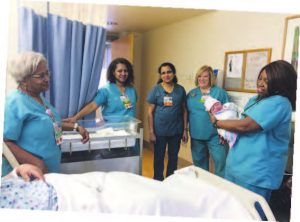
Lekha Sreekumar, WHNP-C and Chantal Berry, CNM,
WHNP-C enjoy a moment with a newborn.
In the modern world, isn’t giving birth about making memories? If your goal is to experience childbirth with minimum medical invasion, and you’re healthy and free of any medical issues that would require a physician’s attention, the Trinitas team of seven midwives can help make that happen. The hospital is home to the second-longest running midwifery program in New Jersey. Each woman can experience her pregnancy and childbirth in a modern maternity unit with private labor/delivery/recovery rooms, and the most advanced medical technology available. A midwife is in charge of a mother-to-be’s care and labor management.
“On every shift, we have a doctor, a nurse/anesthetist, neonatologist or pediatrician, a resident and a midwife, and we work as a team,” says Carol Rose-Trzaska, OB/Gyn Certified Nurse Midwife, who began her training at Trinitas in 1991 and graduated the State University at Downstate in Brooklyn in 1992. “We have strong midwives here who have more years of healthcare experience than some of the doctors.”
After earning a Bachelor of Science in Nursing with a specialized graduate degree in Nurse Midwifery, midwives finish training with enough experience to deliver babies, and provide mothers with newborn care, breastfeeding guidance, and routine gynecological care. Shirley McDuffie, who has been a midwife for 25 years, was a Labor and Delivery nurse in 1981 before going back to school to become a Certified Nurse Midwife. Although she had just had her own baby—and new mothers were not considered good returning-student candidates—she defied the odds. Becoming a midwife was that important to her.
“It was that old way of thinking, that you can’t work and go to school and also be a mother,” she recalls. “I cried every day because I had to leave my son, but I finished school and don’t regret it.”
McDuffie’s story is a testament to the common thread of passion for the work of Trinitas midwives, as well as compassion and empathy for their patients. Shanaya Recalde, MSN, RN, CNM, began her career in 2009 and came to Trinitas this past January. It turned out to be an ideal career move.
“I have worked in other hospitals and I think there’s something special happening at Trinitas,” she explains. “The midwives here possess a wealth of knowledge and have been more than happy and willing to share their experiences with me. They have treated me like family. They are constantly seeking new opportunities to learn and grow. They are supportive of patients’ rights and encourage patient autonomy with birth plans and expectations. They are also a driving force behind the mission to help moms successfully breastfeed. There’s tremendous respect for the midwifery services here.”
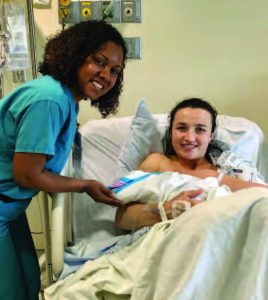
Shanaya Recalde, CNM, WHNP-C with new mom and infant.
At the root of the team’s success is good communication, not just midwife-to-midwife but midwife-to-mom, too. A variety of languages are spoken in the Trinitas Labor & Delivery Unit. For instance, in addition to her 31 years of experience, Chantal Berry, CNM, WHNP-C—who began at Trinitas in 2013—is fluent in both Haitian Creole and English. Upwards of 40,000 Haitians reside in New Jersey, with the majority living within a half-hour of the hospital. Lekha Sreekumar, WHNP-C, an adjunct faculty member of the Trinitas School of Nursing since 2010 (and a nurse practitioner since 2013), brings 30 years of experience to her job, including the ability to speak Malayalam, Tamil and Arabic. Mothers for whom Polish is the first language can connect with Iwona Lewinski, CNM MS, who recently joined the midwifery team. Like Sreekumar, she has a healthcare résumé three decades long. Spanish translators are also available to patients at all times.
In all likelihood, expectant mothers will get to know more than one midwife from the team, particularly if they visit the Women’s Health Center at 65 Jefferson Avenue or in the OB/GYN office at 240 Williamson St. in Room 503, both in Elizabeth. There the midwives see patients from the beginning of their pregnancies through delivery, and into post-partum care.
“Midwives can prescribe medication, order treatments and tests for the well woman or pregnant patients,” says Rose-Trzaska, who blazed a trail with the first and only independent midwifery practice on Staten Island before coming to Trinitas in 2014. “When it comes to dealing with higher risk patients, we consult with the doctor.”
Dr. Jack Perrone, OB/GYN at Trinitas, counts on the midwives for their expertise and the collaborative efforts among all staff members of the Labor and Delivery Unit of the hospital.
“The midwives have for a long time collaborated with the OB/Gyn physicians to provide outstanding care for our patients,” he says. “The midwives provide our low-risk obstetrical care while the physicians concentrate on higher-risk patients. During a low-risk labor, the midwife will both manage and deliver the baby with the physician present as back-up if the need arises.”
That need occasionally involves the decision for a Caesarean section. Having a C-section is not typically part of a woman’s birthing plan, but sometimes it can’t be avoided. That being said, Trinitas was recently singled out for its low C-section rate (16.9%) by the New Jersey Department of Health and New Jersey Hospital Association. That recognition came as part of a statewide initiative to reduce unnecessary Caesarean sections for the well being of mothers and babies.
Once again, Dr. Perrone points out, it all comes down to communication—in this case, between the doctor and midwife.
“Which carries over to the patient, in avoiding a C-section birth unless medically necessary,” he says.
“Because our Midwifery Services are firmly in place, and have been for decades, our commitment to the natural birthing process is solid. There’s no question that a woman in labor will be able to honor her body’s own timetable and have every opportunity to enjoy her baby’s birth as a family event…without ever being rushed to the finish line for our convenience.”
ONE MOTHER’S LAMENT

www.istockphoto.com
I still vividly remember becoming part of my couch while watching back-to-back birthing shows on TLC hoping to live vicariously through another pregnant woman who would accomplish my dream of a completely natural (aka no medical intervention) childbirth. Although I’d heard the pain involved would be like nothing else (meaning worse than) I’d ever experienced, I was more afraid of needles. According to the shows I watched, epidurals seemed par for the course, and I’d just have to wait the full nine months to test my own strength. It didn’t matter that the nurses at my hospital repeatedly offered anesthesia; I avoided it anyway—twice in fact, the second time occurring 22 months later with my second child. Still, I regret not having the guidance and nurturing of a midwife.
—Y.N.F.
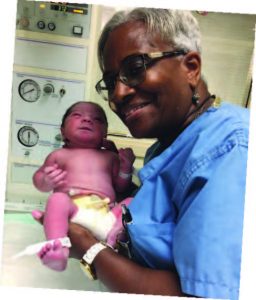
Shirley McDuffie, CNM with newborn.
WHAT DOES IT TAKE TO BE A MIDWIFE?
The Certified Nurse Midwife is a professional care provider—a Registered Nurse (RN) who has graduated from one of more than 30 advanced education programs accredited by the American College of Nurse-Midwives (ACNM). In addition, Certified Nurse Midwifes must pass a national certification examination and meet strict requirements set by state health agencies. Each of the Certified Nurse Midwifes at Trinitas meets and exceeds these requirements. Shirley McDuffie, CNM with newborn.
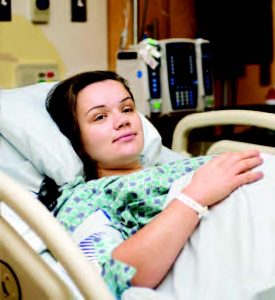
www.istockphoto.com
WHO’S IN THE ROOM?
Obstetricians and neonatologists are present at all times in the Trinitas Labor & Delivery Unit. The scope of collaboration is determined by a mutually agreed upon plan between the midwife and obstetrician. Even if a physician must assume a lead role in the care of a mother-to-be, the midwife may continue to participate in her physical care, guidance, teaching and support.
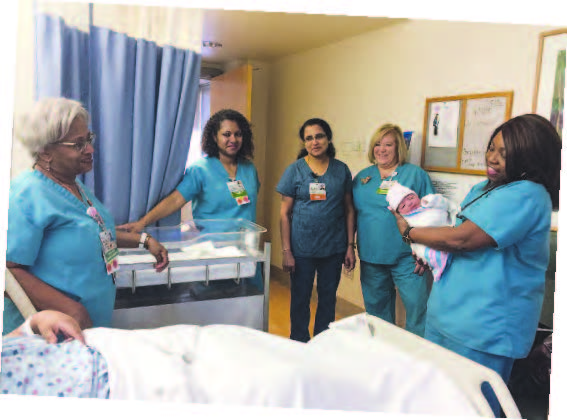 THE TEAM
THE TEAM
Chantal Berry, CNM, WHNP-C
Shirley McDuffie, CNM
Shanaya Recalde, CNM, WHNP-C
Carol Rose Trzaska, CNM.MS
Lekha Sreekumar, WHNP-C
Marybeth Weimer, CNM
Iwona Lewinski, CNM MS
They provide:
- Comprehensive gynecologic care, including annual well-woman physical and pelvic exams
- Education and counseling in nutrition, exercise, physiological and emotional changes, and sexuality
- Breastfeeding assistance and encouragement
- Assistance in developing a personalized birth plan
- Prenatal care
- Labor support and management
Editor’s Note: To set up an initial screening appointment, call either of the following locations:
Trinitas Physician Practice, OB/GYN
240 Williamson Street
Suite 503
Elizabeth, New Jersey
Monday thru Friday (9 to 4:30)
(908) 282–2000
Women’s Health Center
65 Jefferson Avenue
Elizabeth, New Jersey
Monday thru Thursday (9 to 5)
(908) 994-5500





